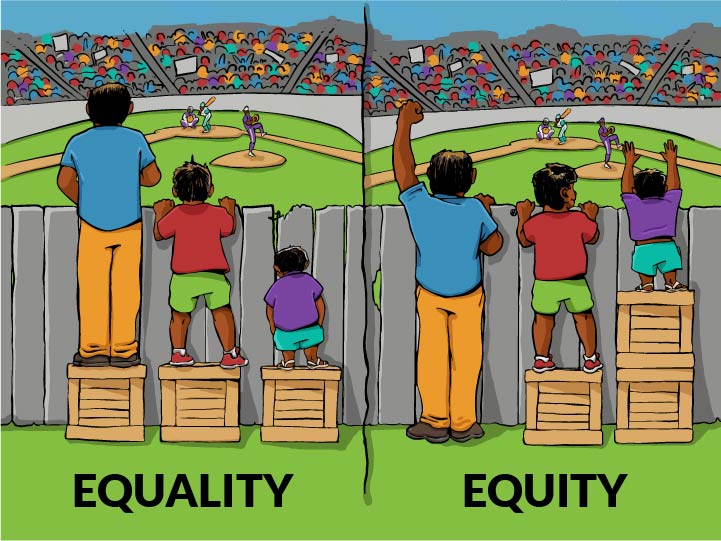My personal belief is that to have long term effective efficiency in any area it must be implemented in an equitable manner. The first reason is an ethical and moral reason and the second is a practical. Solely looking at efficiency without an ethical lens can lead to a less than humane project or policy. If a project or policy is considered inhumane it will not garner much support in general. If you are implementing a new policy at work, or a chore chart at home, or a new governmental policy coworkers, loved ones, and the general populace will only support and work towards the smooth implementation of the project if they believe they are being treated fairly. People will disagree on what is the most effective manner to implement a policy, practice, or idea to be effective and fair but they will create friction and fail to support your projects if it is not going to treat them equitably. People will generally balance their self-interests against others interests so it is important that any project or police that you have the chance to carry out or participate in you make the best effort to examine it from all points of view and parties affected to ensure the most support and frictionless implementation. As you can see illustrated by the drawing below it might be efficient to had out the same size box to everyone but it is not fair nor effective if your goal is to have all persons to be able to see over the fence. Your original plan would also be considered less than efficient if you have to perform extra work to be effective.

interactioninstitute.org and madewithangus.com
You will find that by performing an internet search for equitable and efficiency you will find multiple articles that cover many different agencies and industries with the underlying theme of fairness and efficiency are partners in the best constructed projects. This article by Laura M. Nicolae in the Harvard Crimson is titled Ethical Economics, Not Ethics vs. Economics and she explores the subject that good economic policies do not need to be “devoid of ethics” and that “human ethics are incompatible with good economic policy” she looks at the differences in the decision making process and how both can be included and compared as long as the differences are acknowledged and accounted for fairly. Looking at the efficiency and how that is achieved should be one set of discussions while the ethical implementations should be considered on their own but both should be used to make the final decision; they are not mutually exclusive.
The World Health Organization has an article that explores the need to use existing health resources more efficiently and how that will allow them to distribute those resources in a more equitable manner.
Kimberly Ann Elliott wrote a book called Global Agriculture and the American Farmer: Opportunities for the U.S. Leadership that she talks about in a blog post labeled Making US Agricultural Policy More Efficient, Effective, and Fair. This book focuses on policies that are less effective or efficient because of how they unfairly give advantages to certain parties.
There are multiple examples in different verticals that support the belief that a policy or project that is implemented without considering the ethical or equitable ramifications will actually hinder the efficiency and effectiveness or your policy or project.
Please share your thoughts with me and others about how to be more efficient, effective and, equitable; comment or contact me.
Resources:
http://www.thecrimson.com/article/2017/7/24/nicolae-ethical-economics/
http://www.who.int/health_financing/strategy/equity_efficiency/en/
https://www.cgdev.org/blog/making-us-agricultural-policy-more-efficient-effective-and-fair

I think we as a world, and certainly as a country, need to be more equitable. Perhaps by taking a little of the money out of the equation. Interesting link to the WHO article as well. I look forward to future posts!
LikeLike